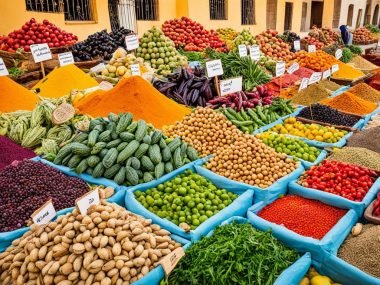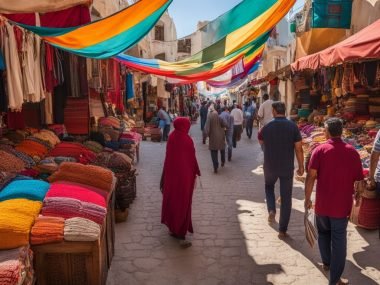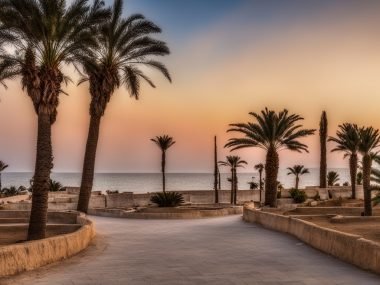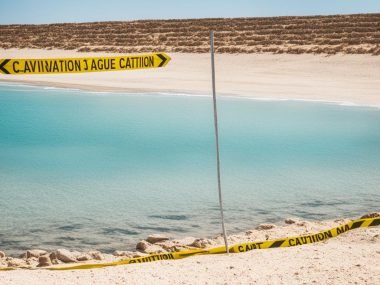Did you know 30 British nationals lost their lives in an attack in 2015? This happened in Port El Kantaoui near Sousse, Tunisia. It shows the ongoing security problems in Tunisia. Even though Tunisia is safer for women compared to many places, the FCDO warns against going to some areas. This is because of terrorist threats and political issues. It’s very important for women travelling alone to know about these advisories. This helps them stay safe.
Since 2015, Tunisia has been in a state of emergency. This is because of recent attacks on security staff and tourists. The country has made laws to protect women’s rights and safety. One example is getting rid of Article 227. Also, they made violence and discrimination against women illegal. Even with these changes, it’s important to follow FCDO advice. If you don’t, you might not be covered by your travel insurance. This is especially true near borders and military areas. Travellers should plan carefully and listen to official advice.
Solo travelling as a woman in Tunisia has its own worries. Harassment is one of them. But, knowing about these problems and how things are currently in Tunisia can really help. Women should take care and respect local ways to travel safely and confidently in Tunisia.
Key Takeaways
- The 2015 attack in Port El Kantaoui claimed 30 British lives, reflecting ongoing security challenges.
- Tunisia’s state of emergency remains in effect due to persistent terrorist threats.
- Legal advancements in women’s rights include the repeal of Article 227 and the criminalisation of violence and discrimination against women.
- Adhering to FCDO guidance is essential to maintain travel insurance validity.
- Solo female travel in Tunisia demands heightened vigilance and respect for local customs due to harassment concerns.
Overview of Women’s Safety in Tunisia
Tunisia is a unique place for female travellers’ safety. Great progress in women’s rights in Tunisia has been made. Yet, there’s still a need for high alert due to terrorism threats. This is especially true in tourist spots or where foreigners gather a lot.
Another important point is the risky area near the Libyan border. This highlights the current Tunisia safety concerns. So, it’s important to follow the travel advisories for women Tunisia. Always check for the latest news from the Foreign, Commonwealth & Development Office (FCDO).
In Tunisia, women live by different social rules than in other places. But the country is forward-thinking. Laws here now better protect women from violence. Police must listen carefully to reports of gender violence, showing a shift towards better women’s rights in Tunisia.
Although the law is strong, travel warnings point out risky areas. To avoid dangers in these Tunisia safety concerns, tourists from the West must heed FCDO advice. Ensure travel insurance is comprehensive, covering all safety risks.
Cultural Norms for Women in Tunisia
When you go to Tunisia, it’s key to know how women should act there. This includes what to wear, how to behave in public, and how to talk to people. Knowing this makes your visit smooth and respectful.
Dress Code
The dress code in Tunisia changes by place and situation. Women should wear clothes that cover more, mainly outside of holiday places and in religious spots. This means clothes should cover your shoulders and knees. It’s very crucial to do this during Ramadan. Dressing simply and not eating in public during daylight respects local ways.
Public Behaviour
Knowing what’s expected in public in Tunisia is vital. In Ramadan, don’t eat or drink in public in the day. Also, don’t show too much affection like kissing or hugging in public. It’s smart for women to have a scarf. This is for covering their head in mosques or traditional places.
Interacting with Locals
Talking to Tunisian people means being respectful and modest. Knowing the cultural norms for women in Tunisia helps in meeting people. Try not to be too loud or too forward. Remember to keep a bit of distance. Saying hello or thank you in Arabic or French is also a good idea. It makes talking easier and friendlier.
Travel Advisories for Women in Tunisia
It’s important to know about travel advisories for women Tunisia. There’s political trouble and the threat of terrorism. This is mainly near borders and military areas. Keep this in mind when you plan your visit.

The FCDO travel advice says to stay alert. Avoid big crowds because unexpected protests happen often. Random security checks show there are real dangers. Following LGBTQI+ laws and local ways can keep you safe.
Following the FCDO travel advice is key for safe travel. Ignoring it might make your insurance useless. These tips are to help us face challenges safely while enjoying Tunisia.
Crime and Safety Concerns
Knowing about crime in Tunisia helps keep women safe. Most visits go well, but theft and robbery are common. Thieves often distract tourists to steal from them, especially in crowded places.
Theft and Robbery
Theft and robbery happen a lot in Tunisia. They mostly happen in places where tourists go. It’s important to watch your stuff, keep valuables safe, and not carry too much money.
Sexual Harassment
Sexual harassment is an issue in Tunisia. It can get worse at certain times and places. Women from other countries might get unwanted attention. Saying “Harem alek” can help show you’re not okay with it.
But even with laws against harassment, some still see foreign women wrongly. Knowing about this can help you stay safe. It’s key to stay up to date on safety tips and respect the local way of life. While harassment does happen, knowing what to do can help avoid it.
Solo Female Travel in Tunisia
Traveling alone in Tunisia can offer unique experiences. Yet, staying safe is key. Be sure to check the latest travel advice before you go. Knowing about safety can greatly improve your trip.
Solo Travel Tips
For solo women in Tunisia, picking the right transport and places to stay is vital. It helps ensure you’re starting from a safe spot. Always choose hotels and transport with good reviews from other travelers.
Keep an eye on what’s happening around you and listen to your gut feeling. Skip unmarked taxis and be careful with help from people you don’t know. Have emergency numbers ready and stay in touch with your loved ones.
Meeting Other Travellers
Making friends in Tunisia can make your trip even better. It can also keep you safe. Stay where you can meet others easily, like hostels or guest houses. Going to group activities or local events is also a smart choice.
When making friends, remember to respect the local ways. Being polite and dressing modestly helps a lot. Always be cautious about sharing your personal details. This way, you can stay safe while enjoying the company of new friends.
Reporting Crimes in Tunisia
Reporting crimes in Tunisia is very important, especially for women seeking legal help. Knowing what steps to take and who to call can really help. It makes a big difference in dealing with these problems.
How to Report
To report a crime, go to the closest police station. Tunisia has made violence against women illegal. This means all incidents must be reported to the police. After reporting, victims are sent for medical checks. This helps with both medical and legal needs. It’s very important to know how to report crimes in Tunisia.
Local Authorities
Local authorities in Tunisia are key in stopping crimes against women. There are emergency numbers and special helplines for quick help. The law now forces the police to take victims of domestic violence to the hospital. This shows Tunisia’s pledge to help women legally. When it comes to property or other laws, it’s smart to ask legal experts for advice. They make sure everything is handled right.
Knowing emergency numbers in Tunisia and how to report crimes is crucial. It helps you get medical and legal help and makes the support system for women stronger.
Female-Friendly Accommodations
Traveling alone means finding cozy and safe places to stay. Tunisia is great for this, with its lovely culture and views. It has places that are perfect for women traveling by themselves. Staying at places with top safety can really make me feel at ease.
Looking for places where women feel safe is key. I search for hotels with great safety and privacy. They offer safe entrances, help all day and night, and some only for women. This makes me feel secure when I’m on my own.
It’s very important to pick the right place in Tunisia. I suggest places highly praised by other women. They usually have what women traveling alone need for safety and comfort.
| Hotel Name | Location | Security Features | Special Amenities |
|---|---|---|---|
| La Villa Bleue | Sidi Bou Said | 24-hour security, CCTV | Female-only floors, spa services |
| Dar El Jeld Hotel & Spa | Tunis | Secure entrances, room safes | Private female-only spa, complimentary breakfast |
| Golden Tulip Carthage Residences | La Marsa | 24-hour reception, secure parking | Wellness centre, fitness classes |
Choosing places in Tunisia that welcome women means I have fun and stay safe. It lets me dive into Tunisia’s magic without worry about my safety.
Healthcare and Emergency Services
When you go to Tunisia, knowing about healthcare and emergency help is key. It’s important to be ready for any health issues on your trip.
Accessing Medical Care
If you need urgent medical help, knowing where to go is critical. Tunisia has different healthcare services to help you. But, it’s good to know where the closest places are before you go. This helps you get help quickly, especially for women’s health.
Insurance Needs
It’s also key to have the right travel insurance. Make sure your insurance covers medical emergencies. This gives you peace of mind and help when you need it. Following FCDO advice is also crucial for your insurance to work well during any emergencies.
Transportation Safety
It’s really important to know about staying safe while travelling in Tunisia. Whether you’re on public transport or driving, knowing the local ways helps a lot. This can make your trip much better.
Public Transport
Tunisia has different public transport like buses, taxis, and trains.
But, you need to be careful. Not all transport options are the same in quality or safety. Choose well-known taxi companies. Try to avoid buses when they’re too full, especially when lots of people are travelling. It’s safer to travel during the day. Keep an eye on your stuff to stay safe.

Road Travel
Driving in Tunisia can be tricky. The driving isn’t always good, and some country roads are dark at night. Make sure you have an international driving permit. Know the local driving rules well, like the strict rules about drinking and driving. Being careful at security checkpoints is also key to a safe trip. Here is a look at some things to keep in mind:
| Context | Recommendations |
|---|---|
| Driving Permit | Obtain an international driving permit before travel. |
| Road Rules | Familiarise yourself with local driving laws, including drink-driving regulations. |
| Security Checkpoints | Remain vigilant and comply with security checks. |
| Driving Standards | Exercise caution; anticipate unpredictable driving behaviour. |
| Unlit Rural Routes | Avoid night-time driving on rural roads to prevent accidents. |
Understanding Regional Risks
Travel to Tunisia needs careful thought about regional risks. The FCDO points out key danger areas. These include the Chaambi Mountains and border zones.
Here, you might see more security and curfews. It shows how important it is to stay alert.
Be aware of social tensions in some coastal towns too. These are often because of migration issues. They can change how safe people feel.
It’s key to look at the FCDO’s travel advice and maps. They show where it’s not safe to go. Not all places in Tunisia are the same. Some are safer than others. Knowing where to avoid helps plan a safe trip.







